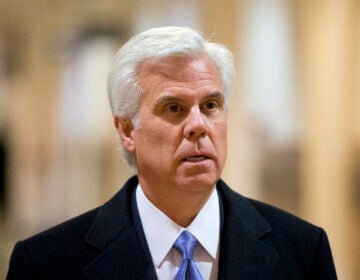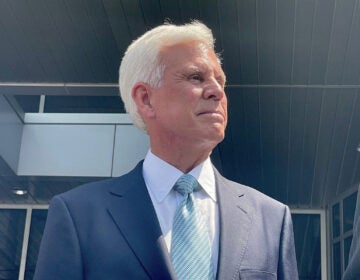George Norcross’ attorneys argue in court their ‘well-connected’ client turned Camden around as they seek dismissal
Defense attorneys argue George Norcross' connections to Camden city government, which is not a crime, turned the city around.
-
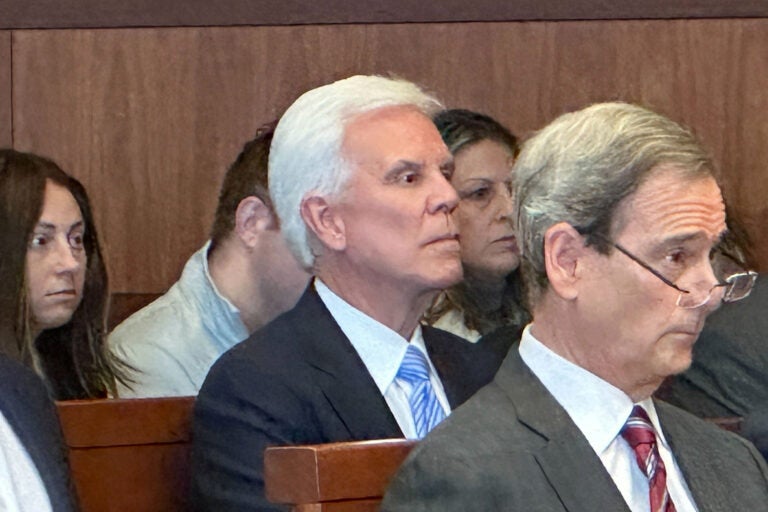
George E. Norcross III looks on from the audience as his attorneys argue for the charges against him and his co-defendants be dismissed. (P. Kenneth Burns/WHYY)
-
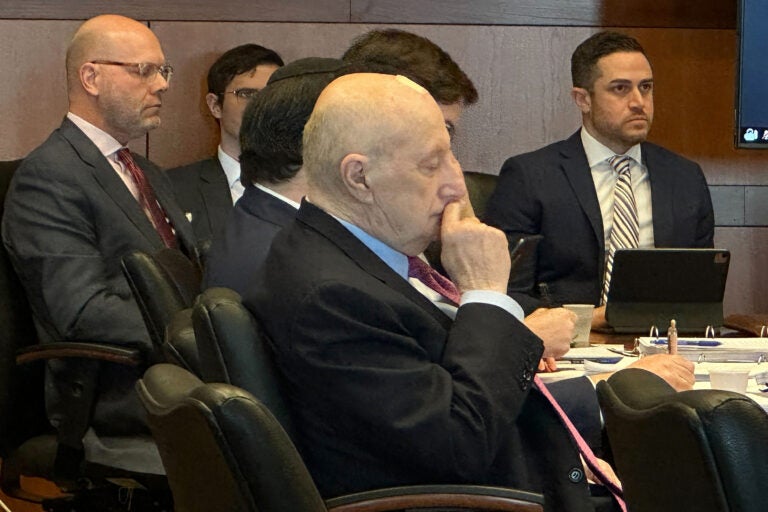
Michael Critchley, defense attorney for George E. Norcross III, listens to arguments from the state.(P. Kenneth Burns/WHYY)
-
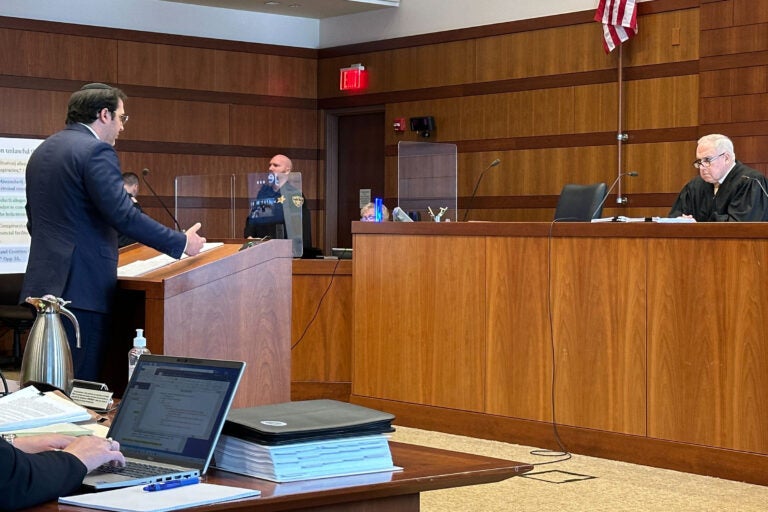
Defense attorney Yakkov Roth (at podium) making an oral presentation to dismiss the indictment against George E. Norcross III and co-defendants. (P. Kenneth Burns/WHYY)
-
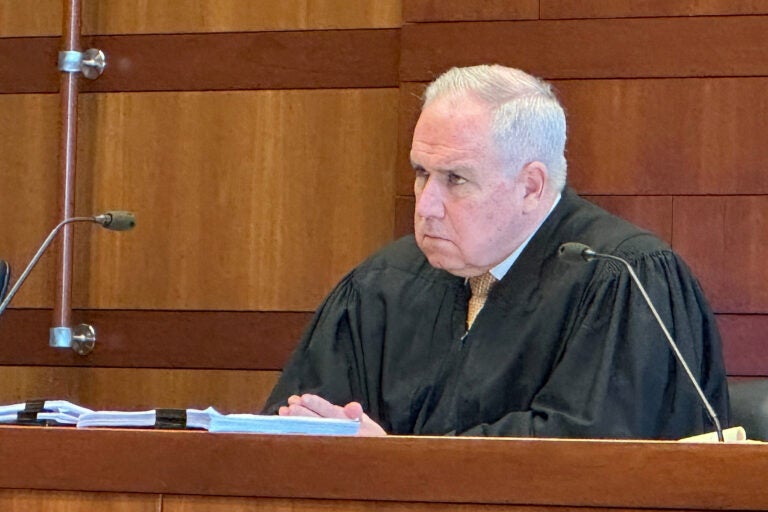
Superior Court Judge Peter Warshaw listening as prosecutors argue that the case against George E. Norcross III should still stand. (P. Kenneth Burns/WHYY)
From Camden and Cherry Hill to Trenton and the Jersey Shore, what about life in New Jersey do you want WHYY News to cover? Let us know.
For about seven hours Wednesday, New Jersey Superior Court Judge Peter Warshaw heard arguments over whether the indictment against George E. Norcross III and his five co-defendants should be dismissed.
George Norcross, younger brother Philip Norcross, former Camden Mayor Dana L. Redd, logistics executive Sidney R. Brown, attorney William M. Tambussi and developer John O’Donnell are accused of executing an enterprise that muscled out George Norcross’ business rivals from owning properties on the Camden waterfront, while reaping benefits of a tax incentive program that was written by Philip Norcross.
Warshaw, citing the travel time that several defense attorneys traveled, offered to go as long as needed to hear all of the arguments, including from attorneys who filed amicus briefs supporting a dismissal of the indictment. Arguments concluded before 6:30 p.m., well beyond the time that a web stream of the proceedings ended, due to available personnel.
Warshaw set the next court date for Feb. 27 after arguments were complete.
It’s not prosecution, it’s politics
In delivering his summary of the arguments for the defendants, Michael Critchley, defense attorney for George Norcross, described the arguments as “a complaint about how our political and economic system begins and operates.”
“They do not like the way this works; vote for somebody who believes in your political position,” Critchley said. “They do not like the way business negotiations are conducted. Sorry, join a different profession.”
That echoed the points Kevin H. Marino, counsel for Philip Norcross, argued earlier in the day. He said, “Camden went from being one of the nation’s most dangerous cities to being a city that President Obama came and visited and told a true renaissance story in the United States” because of the access George and Philip Norcross had to elected officials.
“Carl Dranoff had lots of access,” Marino said. “His problem was he didn’t have as much access as his adversaries.”
Marino added that prosecutors “wish we were at a trial” and the jury was made up of people who would not have had “superior access.”
Assistant Attorney General Michael D. Grillo argued that defense counsel wanted to “divorce” facts in the indictment from the “totality of the circumstances” and context.
“The allegations are clear that [Philip Norcross] demanded directly that [Coopers Ferry Partnership] partner with the enterprise’s preferred development in the event that he directed [Mayor Redd] to ignore Mr. Dranoff’s phone calls as a means of pressuring Mr. Dranoff to accept the enterprise’s demands, and that he caused Camden city officials to slow down the approval of Mr. Dranoff’s PILOT transfer agreement, again, for the purpose of pressuring Mr. Dranoff to relinquish his Radio Lofts redevelopment option,” Grillo said.
Yakkov Roth, another defense attorney for George Norcross who presented the first argument of the day, told the judge that the actions that prosecutors alleged crossed the line are protected by the First Amendment and the Noerr-Pennington doctrine, which protect lobbying by private entities.
“Part of the state’s theory seems to be, in his brief, that George Norcross is so well-connected that there is always this implicit threat that just follows him around,” he said. “I just don’t think that can be a viable theory of extortion, because it functions as a burden on the First Amendment rights petition.”
Grillo countered that the indictment outlines the control George Norcross has over Camden city government adding that “victims are aware of, and believe that that reputation was true.”
“Through his ability to exercise control over the City of Camden’s government, Mr. Dranoff was exempted from doing business in the city at all with anyone, and that is a threat of a completely different enemy,” Grillo said.
Critchley said that what happened between Dranoff and George Norcross was a business transaction and that the state was trying to criminalize it.
After months of what defense attorneys continuously described as “hard bargaining,” Dranoff agreed to a deal with Norcross for about $1.95 million. According to the indictment, Dranoff feared Norcross would put his company through reputational and financial harm.
“If this type of transaction could be criminalized, where you’re getting multiple millions, receiving something in return, how do we conduct an economy?” Critchley said.
Warshaw also heard arguments from the Association of Criminal Defense Lawyers of New Jersey, New Jersey NAACP State Conference, state AFL-CIO and the New Jersey Building and Construction Trades Council, who feared that letting the indictment stand would chill the speech of lawyers, businesses and others.
Robert Scrivo, who represented the defense lawyers association, argued that the indictment, particularly in Tambussi’s situation, “criminalizes the practice of law.”
“What the indictment reveals to practicing attorneys everywhere in this state is that lawyers can take actions consistent with the court rules … not violate them, and still be prosecuted,” he said.
Grillo countered in his response to Scrivo, saying “It is not the routine practice of law that risks prosecution. It’s when it’s done with a criminal intent.”
Robert Levy, representing the NAACP coalition, echoing many of the arguments heard earlier in the day, said if it wasn’t for lobbying and hard-nosed negotiations, Camden would be a different city.
“Take a look at Camden 20 years ago, there wasn’t even a grocery store in the City of Camden,” Levy said. “Through redevelopment, through the conduct of these offenders and multiple other persons, the city has changed dramatically.”
Written arguments were filed before the end of last year. A coalition of labor groups and the New Jersey State Conference of the NAACP had filed an amicus brief supporting arguments from defense attorneys that George Norcross was engaged in “sophisticated” business negotiations.
Attorney General Matt Platkin announced a 13-count indictment last June against George Norcross and his co-defendants. They’ve all pleaded not guilty the following month.

Get daily updates from WHYY News!
WHYY is your source for fact-based, in-depth journalism and information. As a nonprofit organization, we rely on financial support from readers like you. Please give today.



